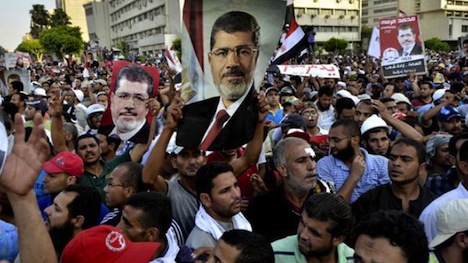For the record, the results of last week’s constitutional referendum are in — voters approved Egypt’s new constitution by a margin of 98.13% to 1.87%, though on a turnout of just 38.6%. ![]()
With the opponents of the new constitution boycotting the vote, including the supporters of Morsi and the Muslim Brotherhood, the lopsided margin makes some sense. The turnout was higher than the 32.9% recorded for the December 2012 constitutional referendum hastily organized to approve the Islamist-friendly constitution promulgated by former president Mohammed Morsi, and it’s only a little lower than the 41.9% turnout in the March 2011 constitutional referendum when optimism ran highest after the collapse of the regime of former president Hosni Mubarak.
But it’s not a great sign for Egyptian democracy that such wide majorities endorsed two very contradictory visions for Egypt’s constitution within the same 13-month period. It’s also not a great sign that the ‘July 3’ regime, the military government that ousted Morsi last summer and headed by interim president Adly Mansour and defense minister and armed forces chief Abdel-Fattah El-Sisi, dispersed and harassed opponents of the new constitution in the days leading up to the vote. By most accounts, the current government hasn’t been as heavy-handed as the Mubarak regime in the 2005 and 2010 votes, which amounted to show elections, but that’s setting the standard for Mansour and El-Sisi fairly low.
Amnesty International on Wednesday harshly condemned the military regime’s use of force and the infringement of human rights since taking power seven months ago. The interim government has repeatedly used lethal force to break up protests, largely in support of the Morsi regime. In a world where the government continues to refuse to allow the Muslim Brotherhood to compete freely and fairly, though, a cloud of doubt will hang over not only the constitutional referendum, but the next two sets of elections.
It’s worth noting that the new constitution marks an improvement in some areas over the 2012 constitution that Morsi pushed through (after initially trying to take dictatorial powers in November 2012) — it theoretically holds Egypt to the standard of international treaties on human rights, takes a zero-tolerance approach to torture, reduces the role of Islam in governance, and improves women’s rights and the rights of religious minorities.
So what comes next? Continue reading Mubarakization watch: Egypt referendum results




